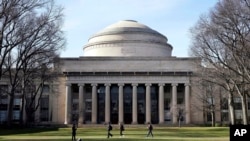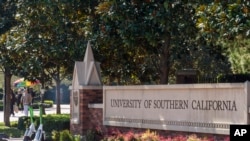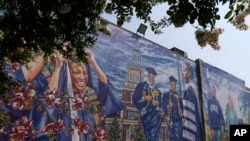Student Union
New Visa Rules Worry Some Students
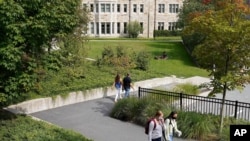
The U.S. has proposed a new rule for international students that would set student visas to a fixed four-year term.
International students looking to extend their stay would be required to apply for an extension, according to the new rule. The rule would also limit international student visas to a fixed two-year term if students are from a country with a visa overstay rate above 10% or a country on the U.S. State Department’s State Sponsor of Terrorism list.
“This change would provide the Department with additional protections and mechanisms to exercise the oversight necessary to vigorously enforce our nation’s immigration laws, protect the integrity of these nonimmigrant programs, and promptly detect national security concerns,” the new rule states.
Current student visa guidelines allow for students to stay in the U.S. during their “duration of status.’’ In other words, student visa holders can stay in the U.S. as long as they are enrolled in school and follow the rules of their immigration status.
Certain study programs can last longer than four years, let alone two years. For example, a doctorate degree can take four to six years to complete, according to Franklin University.
Student visa holders who request to extend their time may do so “if the additional time needed is due to a compelling academic reason, documented medical illness or medical condition, or circumstance that was beyond the student’s control,” the new rule stated.
Sofia Elkin Becerra, a senior at the University of Maryland and the president of the university’s International Student Union, is from Costa Rica. Becerra said she plans on applying for post completion Optional Practical Training (OPT) when she graduates in December.
She said she required a year of extra study for an undisclosed academic disability and is unclear how the news rules will allow for those circumstances.
“The rule is pretty unclear and confusing that even the international student advisers don't have all the answers for students in my situation,” she said. “So, I’m left uncertain of if or how it will even affect me.”
Had the new rule existed before Becerra began her studies in the U.S., she may not have been able to complete her program under the new fixed time period.
“With a fixed time period, as I understand it, this wouldn't have been as easy to do, and I might not have been able to get through college,” she said.
International students applying to extend their student visas must do so for the sole purpose of completing a course of study, according to the new rule.
Kenji Ho, an international student from Singapore, is a junior studying real estate at New York University’s School of Professional Studies. Ho said he is confused by the timing and reasoning of the new rule.
“It makes everything even more uncertain and confusing in an already unpredictable time for international students,” Ho said.
Ho stated that he believes the new rule could add more academic pressure on international students to finish their studies within four years, or even two years for students coming from select countries.
Requiring students to apply for an extension could lessen their chances of approval, Ho said.
While many education associations and students oppose the changes, some lawmakers have criticized what they say is a laxity in student visa approvals.
Two Republican U.S. senators — Tom Cotton of Arkansas and Marsha Blackburn of Tennessee — say U.S. universities are used by foreign nations for espionage and to steal intellectual property.
“Beijing exploits student and research visas to steal science, technology, engineering and manufacturing secrets from U.S. academic and research institutions. We've fed China's innovation drought with American ingenuity and taxpayer dollars for too long,” Blackburn said in a joint statement with Cotton in May.
“It's time to secure the U.S. research enterprise against the CCP's economic espionage,” they stated in a press release.
Lynn Pasquerella, president of the Association of American Colleges and Universities, told VOA in May, “We should also be concerned about the rise of anti-Asian sentiment in the U.S.
“China has been the top collaborator with the U.S. in STEM research. As we are grappling with a global pandemic, international collaboration is more critical than ever,” she wrote to VOA in an email.
Another change that would be made is the departure period for student visa holders from 60 days after completing a course of study, to 30 days.
“The Department accordingly is concerned about the integrity of the programs and a potential for increased risk to national security,” stated the new rule.
In the 2018-2019 school year, 1,095,299 international students studied among 19,828,000 total students in institutions of higher education in the U.S., according to the Institute for International Education.
That makes international students 5.5% of all college and university students in the U.S.
While the number of international students in the U.S. has continued to increase, the rate of application and enrollment has declined in the past three years.
International students in the U.S. at colleges and universities contributed $41 billion to the economy and supported 458,290 jobs, according to the latest analysis of NAFSA: Association of International Educators.
See all News Updates of the Day
US remains top choice for Indian students going abroad
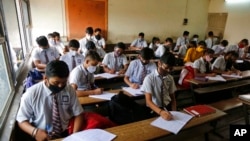
About 69% of Indian students traveling abroad for their studies chose the United States, according to a Oxford International’s Student Global Mobility Index. Other popular choices were the United Kingdom, Canada and Australia.
Education Times reports the main influencers for deciding where to study abroad – for Indian students and others – were parents. (April 2024)
Malaysian official: Schools can’t turn away from global tensions
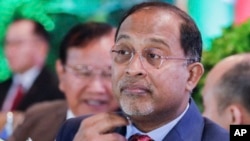
Zambry Abdul Kadir, Malaysia’s higher education minister, said protests spreading across universities in the United States show that schools can’t ignore political tensions.
Helen Packer, reporting in Times Higher Education, said the minister reminded educators that universities are key in the development of leaders, individuals and societies. (April 2024)
Social media breaks are difficult, but necessary

Between online classes, maintaining social connections and working on projects, college students can have a hard time disengaging from the demands of technology.
In Florida International University’s PantherNOW, Ariana Rodriguez offers strategies for taking a break from social media. (April 2024)
- By Melos Ambaye
Many master's degrees aren't worth the investment, research shows
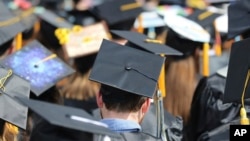
Nearly half of master's degrees have a negative financial return, according to new research by the Foundation for Research on Equal Opportunity, an economic research organization.
The study indicates that many graduate degree programs do not increase lifetime earnings enough to be worth it.
While 23% of bachelor’s degree programs yield a negative financial return on investment, 43% of two-year degrees and master’s degrees fail to deliver a return, according to the study by Preston Cooper, a senior fellow at FREOPP.
Cooper assessed the return on investment for 53,000 degree and certificate programs to determine whether a student’s lifetime earnings outweigh program costs and the risk of not completing their degree.
His findings show that a student’s field of study was the overriding indicator of return on investment at the undergraduate and graduate level.
Engineering, computer science and nursing bachelor’s degrees have high financial returns on investment, while programs in education, fine arts, psychology and English usually have low returns.
Graduate degrees in medicine and law tend to have strong payoffs. But a large share of master’s programs, including the MBA, frequently have low payoffs, according to Cooper.
Although workers with master’s degrees earn 16% more than those with only bachelor’s degrees, Cooper says the figure fails to account for students who had “higher preexisting earnings potential.”
“MBA students typically have high preexisting earnings potential, having often chosen high-ROI undergraduate majors such as finance and economics,” Cooper writes. “So the MBA adds little value on top of that.”
The study indicates that high starting salaries are predictors of high returns on investment. Degrees with starting salaries of $57,000 a year or more deliver the best lifetime returns.
But the return on investment of a degree can vary depending on the educational institution.
“Students interested in fields with low average pay can still find some schools that do well transforming those fields of study into high-paying careers,” Cooper writes.
The quality of an institution also matters, said William Tierney, professor emeritus of higher education at the University of Southern California.
“An MBA from Harvard is a likely ticket to a good job,” Tierney told VOA. “An MBA from the University of Phoenix, less so.”
But students pursue graduate programs for more than just financial reasons.
“Some degrees open up careers in fields that students may enjoy, such as in the performing arts,” Robert Kelchen, head of educational leadership at the University of Tennessee, Knoxville, told VOA.
“Others can help gain access to social networks or simply help students learn about a topic that is of interest,” Kelchen added.
Cooper told VOA that it might make sense for students in degree programs with low returns on investment to switch majors if they can still graduate on time.
He found the worst outcome for a student’s return on investment is dropping out of college “because they must pay for one or more years’ tuition and spend time out of the labor force.”
Lawmakers who fund higher education have a responsibility in ensuring “higher education delivers on its promise of economic mobility,” Cooper said.
Nearly a third of federal funding, including Pell grants and student loans, pays for higher education programs that fail to provide students with a return on investment, according to the study.
Cooper’s view is that “some schools should shut down low-ROI programs and reallocate institutional resources to programs with a better return.”
“There's definitely this narrative out there that higher education is always worth it, and you should always try to get that extra degree because it will increase your earnings,” he told VOA. “That's reinforced by colleges who make lofty promises regarding their graduate degree programs' outcomes, which all too often fall short.”
Harvard students end protest as school agrees to discuss Gaza conflict
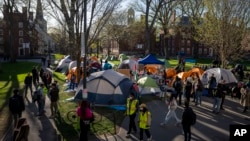
Protesters against the war between Israel and Hamas were voluntarily taking down their tents in Harvard Yard on Tuesday after university officials agreed to discuss their questions about the endowment, bringing a peaceful end to the kinds of demonstrations that were broken up by police on other campuses.
The student protest group Harvard Out of Occupied Palestine said in a statement that the encampment "outlasted its utility with respect to our demands." Meanwhile, Harvard University interim President Alan Garber agreed to pursue a meeting between protesters and university officials regarding the students' questions.
Students at many college campuses this spring set up similar encampments, calling for their schools to cut ties with Israel and businesses that support it.
The Israel-Hamas war began when Hamas and other militants stormed into southern Israel on October 7, killing some 1,200 people and taking 250 hostages. Palestinian militants still hold about 100 captives, and Israel's military has killed more than 35,000 people in Gaza, according to Gaza's Health Ministry, which doesn't distinguish between civilians and combatants.
Harvard said its president and the dean of the Faculty of Arts and Sciences, Hopi Hoekstra, will meet with the protesters to discuss the conflict in the Middle East.
The protesters said they worked out an agreement to meet with university officials, including the Harvard Management Company, which oversees the world's largest academic endowment, valued at about $50 billion.
The protesters' statement said the students will set an agenda that includes discussions on disclosure, divestment, reinvestment and the creation of a Center for Palestine Studies. The students also said that Harvard has offered to retract suspensions of more than 20 students and student workers and back down on disciplinary measures faced by 60 more.
"Since its establishment three weeks ago, the encampment has both broadened and deepened Palestine solidarity organizing on campus," a spokesperson for the protesters said. "It has moved the needle on disclosure and divestment at Harvard."







